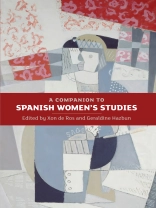An overview of the issues and critical debates in the field of Women’s Studies within the area of peninsular Hispanism.
After an introductory survey of the development of women’s studies in the context of Spain, twenty-one chronologically ordered essays by scholars from Britain, the United States, Spain and Mexico explore women’s roles in the cultural production of their time from the Middle Ages to the present.
The essays of the first half examine the work of the earliest women writers and artists – memoirs and meditations, novellas and plays – and the representationor self-representation of women in a broad sweep of texts including medieval folksong, hagiography, and painting of the Baroque era.
The modern section focuses on women’s participation in politics and culture from the eighteenth century onwards: as translators and essayists, as consumers of visual ephemera and conduct books, as writers and artists, film directors and performers.
An alternative and supplement to standard literary histories, thisvolume offers new insights into women’s agency and representation in the cultural heritage of Spain. It will prove a useful and stimulating resource for students at all levels, and an accessible guide for the general reader.
XON DE ROS and GERALDINE HAZBUN lecture in Spanish literature at the University of Oxford.
CONTRIBUTORS: Nieves Baranda, Andrew M. Beresford, Mónica Bolufer Peruga, Helena Buffery, Rosanna Cantavella, Lou Charnon-Deutsch, Georgina Dopico-Black, Joanna Evans, Carmen Fracchia, Margaret F. Greer, Jessamy Harvey, Louise M. Haywood, Geraldine Hazbun, Susan Kirkpatrick, Frances Lannon, Laura Lonsdale, María Ana Masera Cerutti, Roberta Quance, Xon de Ros, Alexander Samson, Alison Sinclair, Joyce Tolliver.
İçerik tablosu
Female Foundations in the
Libro de Alexandre and
Poema de Fernán González – Geraldine Hazbun
Desire and Transgression in the Feminine Voice of Early Popular Lyric – Maria Ana Beatriz Masera Cerutti
From Virgin Martyr to Holy Harlot: Female Saints in the Middle Ages and the Problem of Classification – Andrew M. Beresford
Choosing and Testing Spouses in Medieval Exemplary Literature – Louise M Haywood
Through Women’s Eyes: The Appropriation of Male Discourse by Three Medieval Women Authors – Nieves Baranda
Intellectual, Contemplative, Administrator: Isabel de Villena and the Vindication of Women – Rosanna Cantavella
Anatomies of a Saint: The Unstable Body of Teresa de Avila – Georgina Dopico-Black
Women’s Artistic Production and their Visual Representation in Early Modern Spain – Carmen Fracchia
The Baroque and the Undead: Carnal Knowledge in the Novellas of María de Zayas y Sotomayor – Margaret R Greer
Distinct Drama? Female Dramatists in Golden Age Spain – Alexander W Samson
Conversations from a Distance: Spanish and French Eighteenth-Century Women Writers – Mónica Bolufer Peruga
What They Saw: Women’s Exposure to and in Visual Culture in Nineteenth-Century Spain – Lou Charnon-Deutsch
Luxurious Borders: Containment and Excess in Nineteenth-Century Spain –
Women as Cultural Agents in Spanish Modernity – Susan Kirkpatrick
Politics and the Feminist Essay in Spain – Joyce Tolliver
The Theatricalized Self: Women Artists and Writers in Masquerade from 1920 to the Present – Roberta Quance
Gender and Change: Identity and Reform in the Second Spanish Republic – Frances Lannon
Invisible Catalan(e)s: Catalan Women Writers and the Contested Space of Home – Helena Buffery and Laura Lonsdale
The Mother and the Nation: Reading Women’s Autobiographies from the 1970s to the Present – Xon de Ros
Tropes of Freedom: Spectacular Eroticism and the Spanish New Woman On-Screen – Jessamy Harvey
Almodóvar’s ‘Others’: Spanish Women Film-Makers, Masquerade and Maternity – Joanna Evans
Yazar hakkında
MARIANA MASERA is a researcher at the Unidad de Investigación sobre Representaciones Culturales y Sociales of the Universidad Nacional Autónoma de México











